- Learning time
- 30 minutes
- First play time
- 120 minutes
Yokohama
Designed by: Hisashi Hayashi
The city of Yokohama in the late 1800s – two to four players play as aspiring merchants, making the most of the new international trade possibilities and recent technological advances as they race to fulfil orders and establish themselves in the various areas of the burgeoning city.
The playing area in Yokohama consists of a large number of small boards, assembled randomly at the beginning of the game. These all represent areas of the city, and players will move their ‘president‘ pawn between areas, activating them to acquire and trade resources, purchase technologies and gather and fulfil orders.
As well as their president, each player has a handful of assistants – these are seeded on the board each turn, and to a large extent dictate where your president can go – the president can’t move through an area where he/she doesn’t have at least one assistant. The other thing assistants do is make your actions more powerful; each area has five levels of activation, and the more pieces a player has on the board when their president visits that spot, the more powerful their action will be. Once activated, all the assistants on a spot must be removed, and so the cycle goes.
Each player has a warehouse board packed with more assistants, as well as shops and trading houses, all of which can be removed ready for use by visiting the Employment Agency area of the board. The shops and trading houses can be added to areas when a player takes a more powerful action – they will remain there for the rest of the game, bolstering your actions on subsequent visits, and earning you money when others visit.
Once you start fulfilling orders and gaining technologies, you’ll be collecting the flags of foreign nations – each matching pair you collect gives you access to a foreign agent, a one-use extra action that can be really useful later in the game.
If all this is starting to sound a bit complicated, your first look at a game in progress might have you reaching for the ibuprofen – the myriad boards that make up the game will cover most of a decent-sized table, and on top of this sprawling chaos sit building site cards, technology and order cards, and player pieces. But this is the real selling-point of the game – each time you play, the boards are assembled randomly – and the building sites randomly on top of them – so each play will be a unique set of puzzles to solve, favoured routes to pursue and rewards to gain.
And once you start playing, everything slots into place very quickly. Turns are neat and (for the most part) swift, and there are precious few phases to a turn to worry about – play your assistants, move your president, activate the area, take back the assistants on that area. Towards the end of the game, access to foreign agents may give you an extra action, as may fulfilling an order or two – but for the most part gameplay is nice and fluid, and continues until one of the endgame conditions are met. Once a player has built all six shops, or all four trading houses – or when the order or technology card rows can’t be replenished – play will continue to the end of the round and then each player gets one more turn.
There are a handful of end game bonuses to be handed out, including your sets of foreign flags – remember you were collecting matching pairs to get foreign agents? Well now you’ll get points for differing sets, as well as points for having the most technologies, and making the biggest contribution to the church and customs house.
Joe says
Once you've got over the daunting presence of this game on the table - it looks a bit like the map of a game designer's brain (without handy labels) - there's a surprisingly taut, satisfying game here. Some games like this require quite long-term thinking, setting up moves for several turns ahead. With Yokohama, there's always something beneficial you can do on your turn, and if it isn't the most 100% optimal choice, who cares? Not me. I like the speedy turns - so if you are planning ahead, you're not waiting round for ten minutes between turns trying to hold on to your convoluted schemes. Yokohama is currently a firm favourite of mine.
The guru's verdict

-
Take That!
Take That!
You can't go where someone else's president is, so most of the interaction is in the form of blocking; which some players could feel frustrated and thwarted by.
-
Fidget Factor!
Fidget Factor!
Turns are rarely very long - the gameplay is very fluid and dynamic, with no 'phases' to bog things down.
-
Brain Burn!
Brain Burn!
Whilst others are playing, you might well be working out your optimal route for your next turn or two. Holding all your plans in your head can get a bit exhausting - but you don't have to do it - you can easily decide what to do once your turn rolls around.
-
Again Again!
Again Again!
The modular board setup means every single game will be different - the goals will be the same, but the routes to achieve them and rewards gathered along the way will change. So if you enjoy the game, there are endless permuatations to be explored.

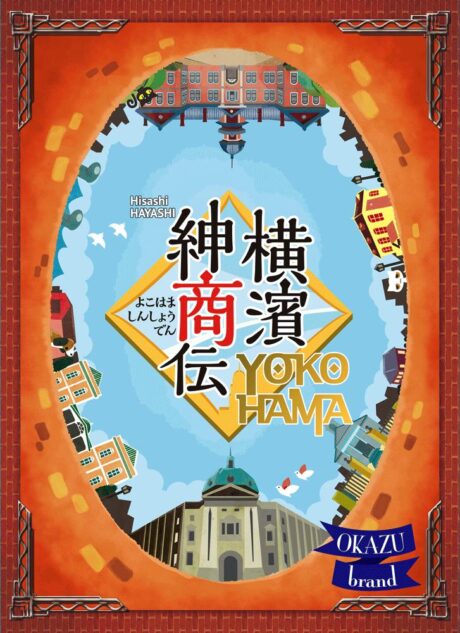
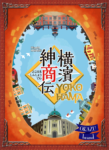
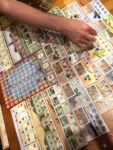
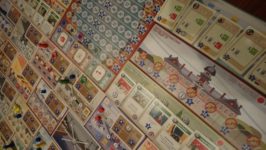


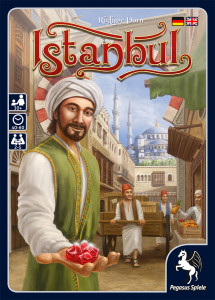
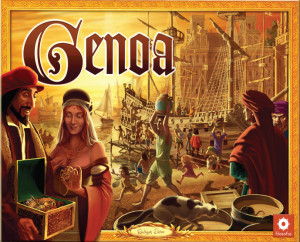


Sam says
Only one play of Yokohama under my belt so far, but I am intrigued to play it again. Despite the unwieldy appearance and seeming cognitive overload, as we played through our debut game and got our heads around what we were supposed to be doing, the turns sped up until they were fairly zipping by. It's the type of game where there are always interesting choices, and I like that.